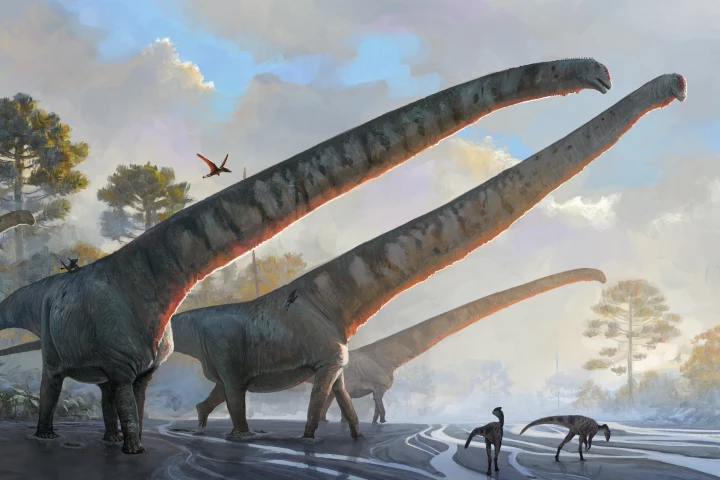Stony Brook University
-
It’s no secret that sauropods had really long necks, but now paleontologists claim to have identified the species that takes the crown. According to the team, Mamenchisaurus has the longest neck of any known animal ever, measuring 50 ft (over 15 m).
-
The universe likes to play coy about its age, but we have a pretty good idea of the range. Now, a series of new studies has investigated the question using different methods, and have reached different answers, separated by more than a billion years.
-
Astronomers have studied the ringing tones of a newly-created black hole for the first time, proving Einstein right once again.
-
VR is great at immersing us in gigantic worlds that seem to go on forever – until you bump into the living room wall. Now computer scientists have developed a system that tricks you into walking around in circles in the real world, while thinking you’re moving longer distances in the virtual world.
-
Prolonged exposure to lunar dust could make staying on the Moon a risky business. In tests, exposure to dust particles of simulated lunar soil resulted in up to 90 percent of human lung cells and mouse neurons being killed, with the potential for increased cancer risk also evident.
-
We've been worrying about hackers taking control of our autonomous vehicles, but it turns out they could be spooked by much simpler means. A team of researchers says stickers on street signs could be enough to confuse self-driving cars.
-
Smartwatch screens make some functions, like entering text, more fiddly than they’d be on a phone. Now a team from Stony Brook University has developed a rotational keyboard that allows users to pick letters from a ring around the screen, like an old rotary phone.
-
Many Madagascar villages aren't accessed by decent roads. This means that it can be difficult getting medical samples to labs in a timely fashion. That's where a project led by Stony Brook University comes in. It's been using drones to get samples from those villages to a testing center.
-
Back in January, a Johns Hopkins University study was released claiming that two-thirds of cancers are down to random mutations. Now, a research team is refuting that claim, carrying out a four part investigation that counters the argument.
-
New research suggests that sleeping on your side, as opposed to your back or stomach, could help cut the chances of developing some neurological disorders, including Alzheimer's and Parkinson's.
-
Imagine if there were robots that could squirm through debris to reach buried survivors at disaster sites, or even travel through patients' bodies to perform medical procedures. A team of scientists is working on making such technology a reality, using a combination of polyurethane foam and wax.
-
Scientists have synthesized "forbidden" exotic new materials out of ordinary table salt. The research is expected to spark a new chapter in chemistry and lead to the discovery of completely new chemical compounds with unusual properties that also have practical applications.
Load More











